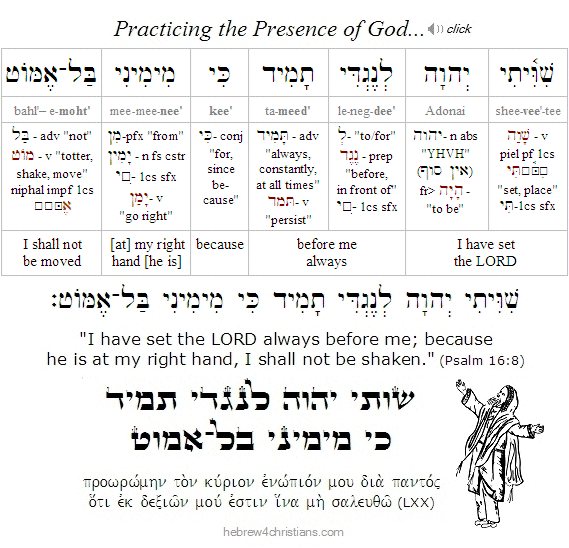|
"I have sinned, for I did not know that you stood in the road against me" (Num. 22:34). The sages comment that ignorance of the Divine Presence is not a legitimate excuse. The whole world is filled with God's glory, though this awareness is suppressed because of sin. Ignorance (literally the "state of ignoring" moral and spiritual truth) is a choice for which we are responsible (Rom. 1:18-20). Sin blinds us to our eternal responsibility. The antidote to ignorance is to become mindful, awake, and aware... We must choose to attend to God's Presence, as David said, "I have set the LORD always before me" (Psalm 16:8). King David knew, of course, that God was always present, all-seeing, all-knowing, and all-powerful, yet he consciously turned to God in heartfelt humility. David "practiced the presence" of the LORD by realizing that all that he said, did, and even thought was before the Presence of the Master of the Universe.
שִׁוִּיתִי יְהוָה לְנֶגְדִּי תָמִיד
כִּי מִימִינִי בַּל־אֶמּוֹט
shee·vee'·tee · Adonai · le·neg·dee · ta·meed
kee · mee·mee·nee · bal · e·moht

"I have set the LORD always before me;
because he is at my right hand, I shall not be shaken."
(Psalm 16:8)
Hebrew Study Card


To repair the breach between "faith" and "practice," to unify his heart and its affections, David determined to "set" the LORD before him. Note that the verb "set" here is piel, that is, intensive... We must intently focus our mind and heart to regard ourselves as in the Presence of God; we must sense His eye upon us and "know before Whom we stand." The sages say that when David wrote these words, he was referring to the scroll of Torah which he kept tied to his arm (shel yad). King David literally "set" the Word of the LORD upon his right hand to help him keep focused.
|




